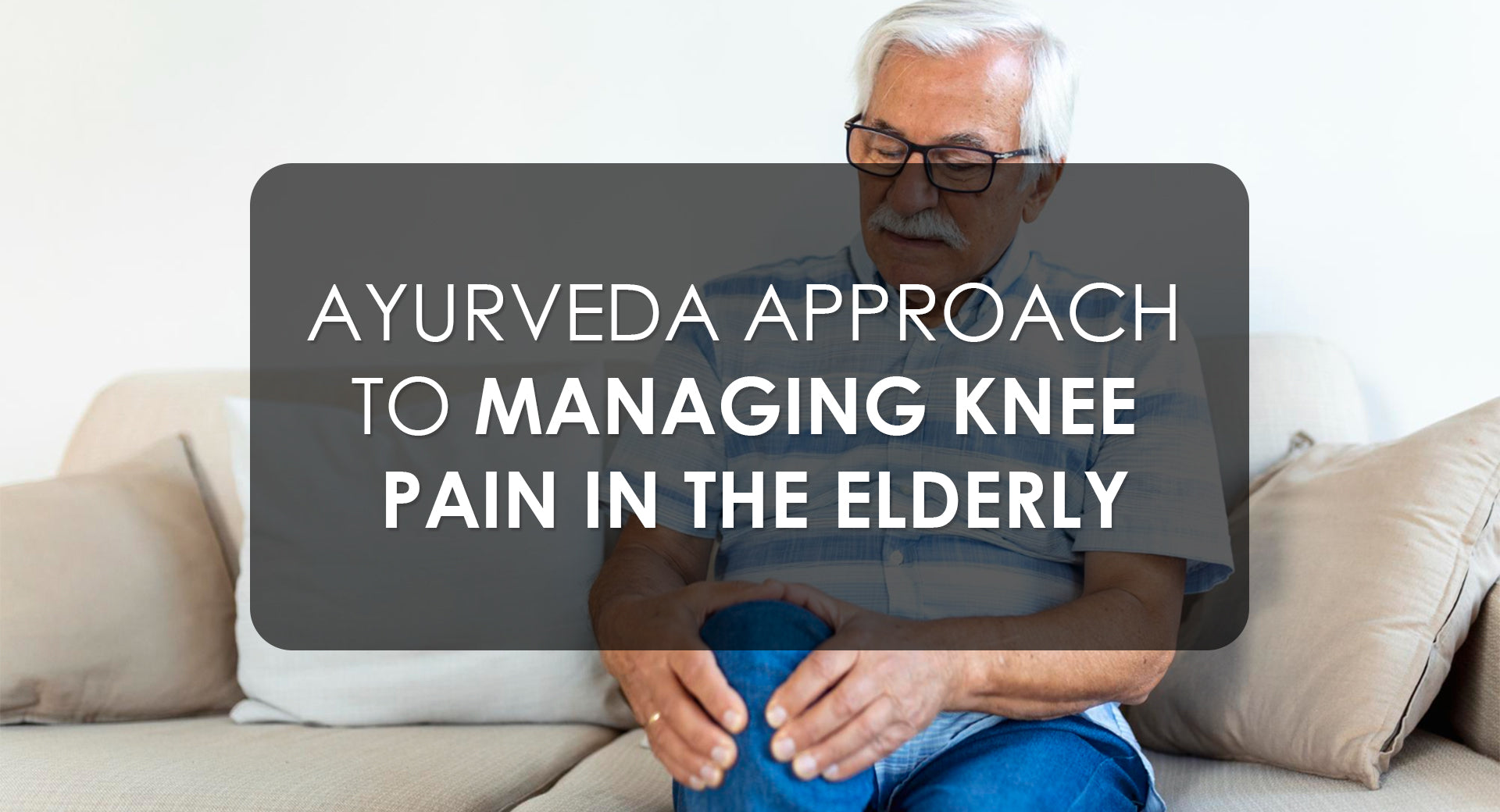
Ayurveda Approach to Managing Knee Pain in the Elderly
Ah!! the Knee pain again. Knee pain is a common problem in the aged population and can be caused by a number of reasons, including osteoarthritis, inflammation, accidents, and aging-related wear and tear. Ayurveda, the traditional Indian medical system, offers a holistic approach that focuses on restoring balance to the body and mind to naturally relieve knee pain, while modern medicine offers options like painkillers, injections, and surgery. This blog post will discuss Ayurvedic ideas and treatments for senior knee discomfort.
About Ayurveda: In Ayurveda, good health is a state of connection between the mind, body, and spirit. Ayurvedic principles state that knee pain may be caused by an imbalance between the vata, pitta, and kapha doshas. The dryness and instability that are signs of vata imbalance are frequently linked to knee discomfort in the elderly.
Reasons Behind Knee Pain:
Only by knowing the reasons will be the first step towards taking care of the knee pain. So here are some main reasons of Knee pain:
Arthritis: One of the main causes of knee pain in the elderly is arthritis, a progressive joint disease. The knee joint's protecting cartilage weakens with time, causing discomfort, stiffness, and decreased freedom of movement. The chance of having arthritis is increased by age, genetics, prior joint injury, and obesity, among other factors.
Recommended Product: Joint Pain Care Juice
Injuries: Knee injuries like fractures, meniscal tears, and ligament tears can cause ongoing pain and instability in the knee joint, especially as we age.
Weak muscles: Muscles such as the hamstrings and quadriceps, can also lead to knee pain. This is because muscle imbalances and inflexibility can alter joint movement and put increased strain on the knee joint. It's important to maintain strong and flexible muscles to support overall knee health.
Bad Posture : If you don’t line them up just right, they’ll eventually topple over. That’s similar to what happens when we don’t sit or stand straight—our knees take on the extra load and start to complain.a Bad posture and alignment can cause too much pressure on the knees, which can cause pain and discomfort.Over time, the stand gets wobbly and starts to strain. That’s what happens to your knees when your posture is off.
Obesity: Imagine your knees are like the springs in a mattress. If the mattress is too heavy, the springs get squished and can’t bounce back. That’s what excess weight does to your knees—it squashes them down, leading to aches and potential damage.
Sedentary Lifestyle: Not getting enough activity on a daily basis can weaken muscles, decrease joint flexibility, and aggravate knee discomfort. In addition to making people more likely to gain weight, inactive behavior causes knee problems.
Ayurvedic Management of Knee Pain:
Drawing upon ancient wisdom, Ayurvedic approaches offer a multifaceted strategy for managing knee pain in the elderly:
Balancing Vata Dosha: Ayurvedic treatments aim to pacify Vata dosha through dietary modifications, lifestyle adjustments, and therapeutic interventions. Warm, nourishing foods and herbal remedies help alleviate dryness and inflammation within the joints.
Strengthening and Stretching Exercises: Gentle yoga postures and exercises tailored to improve muscle strength and flexibility can alleviate knee pain and enhance joint stability. Regular physical activity promotes circulation, lubrication, and overall joint health.
Herbal Remedies: Ayurvedic herbs with anti-inflammatory and analgesic properties, such as Ashwagandha, Guggulu, Shallaki, and Turmeric, offer natural relief from knee discomfort. These herbs can be consumed internally or applied topically as oils and ointments.
Lifestyle Modifications: Ayurveda emphasizes the importance of maintaining a balanced lifestyle to support joint health. Adequate rest, hydration, and stress management techniques contribute to overall well-being and alleviate knee pain.
Panchakarma Therapies: In severe cases of knee pain, Ayurvedic detoxification therapies, such as Abhyanga (oil massage), Swedana (herbal steam therapy), and Basti (medicated enema), help eliminate toxins and rejuvenate the body's tissues.
Knee pain in the elderly arises from a complex interplay of factors, including degenerative changes, injuries, lifestyle habits, and imbalances in the body's energies. Ayurveda offers a holistic approach to managing knee pain by addressing the root causes and restoring harmony within the body. Through dietary adjustments, herbal remedies, physical activity, and therapeutic interventions, Ayurvedic principles empower individuals to alleviate knee discomfort and enhance their overall quality of life in their later years.
Frequently Asked Questions:
Q1. Is Ayurvedic treatment safe for elderly knee pain?
It's totally safe to use ayurvedic treatments when administered by qualified ayurvedic practitioners.
Q2. How soon can one see results with Ayurvedic knee pain treatment?
Results vary based on factors like severity and adherence to treatment. Some may experience improvement within weeks, while others may need more time.
Q3. Are there dietary recommendations for Ayurvedic knee pain management?
Ayurveda suggests warm, nourishing foods like ginger and turmeric. Specific recommendations may vary based on individual constitution and health conditions.
Q4. Can Ayurveda help with arthritis-related knee pain?
Ayurvedic treatments can address inflammation and promote joint health, aiding in arthritis-related knee pain management.
Q5. Are there side effects with Ayurvedic knee pain treatments?
It's totally safe to use ayurvedic treatments when administered by qualified ayurvedic practitioners.
Q6. Can Ayurveda be used alongside conventional treatments?
Yes, Ayurvedic approaches can complement conventional treatments, enhancing overall effectiveness and promoting holistic well-being. Coordination between Ayurvedic and conventional healthcare providers is essential for safe care.
Share










